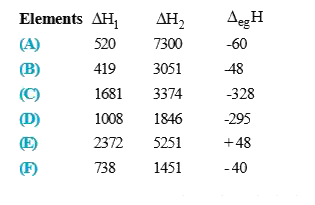Electron gain enthalpies of noble gases are negative.
Step by step video & image solution for Electron gain enthalpies of noble gases are negative. by Chemistry experts to help you in doubts & scoring excellent marks in Class 11 exams.
Updated on:21/07/2023Topper's Solved these Questions
- CLASSIFICATION OF ELEMENTS AND PERIODICITY IN PROPERTIESBOOK - ICSECHAPTER - CLASSIFICATION OF ELEMENTS AND PERIODICITY IN PROPERTIESEXERCISE - OBJECTIVE (MULTIPLE CHOICE) TYPE QUESTIONS
54 Videos
- CLASSIFICATION OF ELEMENTS AND PERIODICITY IN PROPERTIESBOOK - ICSECHAPTER - CLASSIFICATION OF ELEMENTS AND PERIODICITY IN PROPERTIESEXERCISE - TRUE OR FALSE TYPE QUESTIONS
20 Videos
- CLASSIFICATION OF ELEMENTS AND PERIODICITY IN PROPERTIESBOOK - ICSECHAPTER - CLASSIFICATION OF ELEMENTS AND PERIODICITY IN PROPERTIESEXERCISE - SHORT ANSWER TYPE QUESTIONS
33 Videos
- CHEMICAL THERMODYNAMICS BOOK - ICSECHAPTER - CHEMICAL THERMODYNAMICS EXERCISE - NCERT TEXT-BOOK. EXERCISES
22 Videos
- ENVIRONMENTAL CHEMISTRY BOOK - ICSECHAPTER - ENVIRONMENTAL CHEMISTRY EXERCISE - NCERT TEXT-BOOK EXERCISE
20 Videos
Similar Questions
Electron Gain Enthalpy
View SolutionDefine electron gain enthalpy. Explain why electron gain enthalpies of some elements are positive. How does electron gain enthalpy vary in a group and in a period ?
View SolutionWould you expect the second electron gain enthalpy of O as positive, more negative or less negative than the first? Justify your answer.
View SolutionWould you expect the second electron gain enthalpy of S as positive, more negative or less negative than the first? Justify your answer.
View SolutionAssertion : The electron gain enthalpy of chlorine is less negative than that of fluorine.
Reason : The fluorine atom is much smaller in size than that of chlorine.
View SolutionThe periodicity is related to the electronic configuration. That is, all chemical and physical properties are a manifestation of the electronic configuration of the elements.
The atomic and ionic radii generally decrease in a period from left to right. As a consequence, the ionization enthalpies generally increase and electron gain enthalpies become more negative across a period. In other words, the ionization enthalpy of the exterme left element in a period is the least and teh electron gain enthalpy of the element on the exterme right is the highest negative. This results into high chemical reactivity at the two extermes and the lowest in he centre. Similarly down the group, the increase in atomic and ionic radii result in gradual decrease in ionization enthalpies and a regular decrease (with exception in some third period elements) in electron gain enthalpies in the case of main group elements.
The loss and gain of electrons can be co-related with the reducting and oxidising behaviour, and also with metallic and non-metallic character respectively, of the elements.
Which of the following statements is correct?
View SolutionThe periodicity is related to the electronic configuration. That is, all chemical and physical properties are a manifestation of the electronic configuration of the elements.
The atomic and ionic radii generally decrease in a period from left to right. As a consequence, the ionization enthalpies generally increase and electron gain enthalpies become more negative across a period. In other words, the ionization enthalpy of the exterme left element in a period is the least and teh electron gain enthalpy of the element on the exterme right is the highest negative. This results into high chemical reactivity at the two extermes and the lowest in he centre. Similarly down the group, the increase in atomic and ionic radii result in gradual decrease in ionization enthalpies and a regular decrease (with exception in some third period elements) in electron gain enthalpies in the case of main group elements.
The loss and gain of electrons can be co-related with the reducting and oxidising behaviour, and also with metallic and non-metallic character respectively, of the elements.
The correct order of the metallic character is:
View SolutionNitrogen has positive electron gain enthalpy whereas oxygen has negative. However, oxygen has lower ionisation enthalpy than nitrogen. Explain.
View SolutionWould you expect the second electron gain enthalpy of O as positive , more negative or less negative than the first? Justify your answer.
View SolutionThe first and second ionization enthalpies and electron gain enthalpy of some elements are as given below:

Which of these elements is the most reactive metal?
View Solution